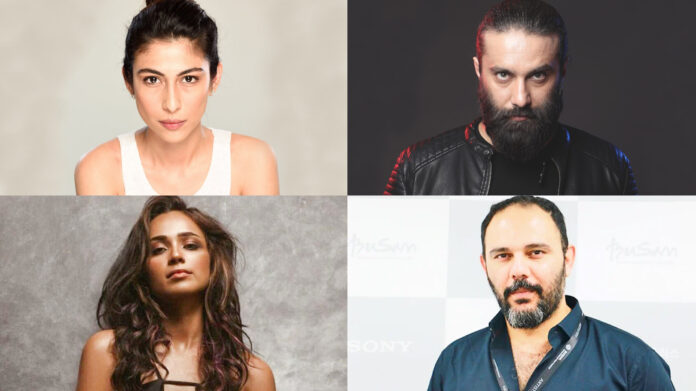Actress Faryal Mehmood recently shed light on the significant transformation in the attitudes and behaviors of Pakistani male actors following the global #MeToo movement. In a candid interview on Momin Saqib’s show “Had Kar Di,” the Gustakh actor expressed her observations about the change that has taken place within the industry.
Faryal noted, “Since the #MeToo Movement, I’ve seen a lot of change in male actors. They treat us with a lot of respect and love now. It’s almost like it was never a problem.”
Faryal Mehmood’s statement underscores the profound impact of the #MeToo movement on the Pakistani entertainment industry. Her observations serve as a starting point to delve deeper into the transformations and conversations within the industry.
The #MeToo movement, which gained global prominence in late 2017, was a watershed moment in the fight against sexual harassment and misconduct. It empowered countless individuals to come forward and share their experiences, hold perpetrators accountable, and demand justice. However, while the movement found resonance in various parts of the world, including the United States and India, it faced unique challenges in Pakistan.
Voices of Change – How Did Pakistani Celebrities React to The #MeToo Movement
Faryal Mehmood is not alone in recognizing the changes spurred by the #MeToo movement within the Pakistani entertainment world. Several prominent figures have shared their insights and experiences, a few of which include:
Jami
The acclaimed filmmaker Jami took a brave step by sharing his own experience of sexual assault, sparking a crucial conversation. His revelation not only highlighted the prevalence of harassment but also inspired solidarity among industry peers. Jami’s courage led to increased accountability and efforts to eradicate harassment from the industry.
Saba Qamar
The versatile actress Saba Qamar addressed the issue of harassment in the entertainment industry as well. She emphasized the need for actors to speak up against harassment and called for collective action to ensure a safer working environment. Saba’s willingness to discuss such sensitive topics has encouraged others to follow suit.
Sadaf Kanwal
The renowned model and actress Sadaf Kanwal expressed her views on the #MeToo movement, albeit with a different perspective. Asserting that she has never been a victim of sexual harassment of any sort, Sadaf shared, “You know aap ke saath MeToo jab ho, tab boldo. Baad mai aap ko yaad araha hai MeToo (One should speak up about it when it happens).” While her stance differs from those who have openly shared their experiences, Sadaf’s comments highlight the complexity of the issue and the varying opinions within the industry regarding how to address harassment and abuse.
The #MeToo Movement in Pakistan
The #MeToo movement, which originated in the United States, made its way to Pakistan, exposing numerous instances of harassment, abuse, and misconduct within the entertainment industry. Several high-profile cases rocked the nation, leading to a reckoning within the industry. Allegations against influential figures prompted discussions on power dynamics, accountability, and the urgent need for change.
As we reflect on the state of the #MeToo movement in Pakistan, let us remain optimistic that the situation will improve. The industry and society at large can continue to evolve toward a culture of transparency, accountability, and respect.
The #MeToo Movement: Barriers to Speaking Out
- Cultural Stigma and Shame: One of the major deterrents to coming forward in Pakistan is the deeply ingrained cultural stigma associated with discussing matters related to sexual harassment or abuse. Victims often fear being ostracized, blamed, or shamed by their families, friends, and communities. The conservative nature of Pakistani society, where issues of honor and modesty hold great significance, adds an additional layer of silence around such matters.
- Fear of Retaliation: Survivors in Pakistan often fear retaliation by their perpetrators, who may have significant social or economic power. Many perpetrators use their influence to suppress victims and ensure their silence, making it difficult for survivors to come forward without facing consequences.
- Inadequate Legal Framework: Pakistan’s legal framework pertaining to sexual harassment and abuse has been criticized for being inadequate and ineffective. While some laws exist, their enforcement and implementation are inconsistent, leaving survivors with little faith in the legal system’s ability to deliver justice.
Ultimately, it is the responsibility of all stakeholders, from actors and directors to audiences and policymakers, to work together to create an environment where everyone feels safe and valued. Only then can the true potential of the #MeToo movement be realized in Pakistan. It is also up to stakeholders to minimize misuse of the movement and its motives.
Conclusion
The #MeToo movement has undoubtedly sparked a degree of introspection within the Pakistani entertainment industry, leading to changes in the ways actors interact on set. While some notable voices like Faryal Mehmood, Saba Qamar, and Jami have spoken out about harassment and misconduct, it’s essential to acknowledge that the movement’s impact has largely been limited in Pakistan.
While the road ahead may seem challenging, it is crucial to remain hopeful. The conversation about harassment, consent, and respect within the entertainment industry has begun, albeit slowly. The #MeToo movement may not have achieved the widespread change that many had hoped for, but it has planted the seeds of awareness and accountability. It serves as a reminder that change takes time and collective effort.




